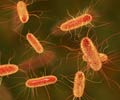Unlike the popular correlation of E. coli with sickness and food poisoning, the malevolent bacteria may also be the key to the future of renewable energy, study suggests.

"If we can engineer biological organisms to produce biodiesel fuels, we'll have a new way of storing and using energy," Lun said.
Creating renewable energy by making fuels, like making ethanol out of corn, has been a common practice in trying to achieve sustainability.
However, Lun said, "It's widely acknowledged that making fuel out of food sources is not very sustainable. It's too expensive and it competes with our food sources."
One alternative is to modify the E. coli microorganism to make it overproduce fatty acids, which are used to make bio diesel.
"Fatty acid molecules aren't that different from a lot of fuel molecules.
Advertisement
Lun has build computational models of the E. coli organisms to determine what would happen if changes were made. Those changes could include removing enzymes to enhance fatty acid production.
Advertisement
We're putting in entirely new traits rather than modifying existing traits."
Source-ANI















